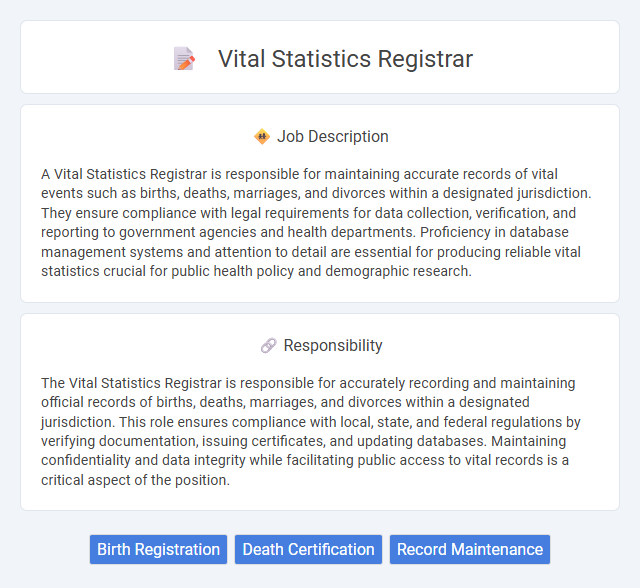
A Vital Statistics Registrar is responsible for maintaining accurate records of vital events such as births, deaths, marriages, and divorces within a designated jurisdiction. They ensure compliance with legal requirements for data collection, verification, and reporting to government agencies and health departments. Proficiency in database management systems and attention to detail are essential for producing reliable vital statistics crucial for public health policy and demographic research.
Individuals with strong attention to detail and a methodical approach are likely suitable for the Vital Statistics Registrar role, as accuracy is crucial when handling sensitive demographic data. Those comfortable with administrative tasks and maintaining confidentiality may find this position appropriate due to the nature of personal records involved. People who prefer routine and data management might have a higher probability of thriving in this job compared to those who seek more dynamic or social work environments.
Qualification
A Vital Statistics Registrar typically requires a bachelor's degree in public administration, statistics, or a related field to manage and maintain accurate records of births, deaths, marriages, and other vital events. Proficiency in data management software, strong attention to detail, and knowledge of local and national reporting laws are essential qualifications. Certification or additional training in vital records management enhances the candidate's ability to ensure compliance and data integrity.
Responsibility
The Vital Statistics Registrar is responsible for accurately recording and maintaining official records of births, deaths, marriages, and divorces within a designated jurisdiction. This role ensures compliance with local, state, and federal regulations by verifying documentation, issuing certificates, and updating databases. Maintaining confidentiality and data integrity while facilitating public access to vital records is a critical aspect of the position.
Benefit
A Vital Statistics Registrar likely provides crucial support to public health and government agencies by accurately recording birth, death, and marriage data, which benefits population management and policy development. The role may enhance job stability due to its importance in maintaining legal and demographic records essential for societal functioning. Employees might also experience satisfaction from contributing to the integrity and reliability of vital statistics that influence resource allocation and health interventions.
Challenge
The Vital Statistics Registrar job likely involves managing large volumes of sensitive demographic data, which can pose significant challenges related to data accuracy and confidentiality. Ensuring compliance with legal regulations and adapting to evolving data collection technologies may also present ongoing obstacles. The probability of encountering complex verification cases or discrepancies that require meticulous attention and problem-solving skills is relatively high.
Career Advancement
A Vital Statistics Registrar manages the accurate documentation and maintenance of birth, marriage, and death records, playing a critical role in public health and legal identification systems. Career advancement opportunities often lead to supervisory or managerial positions within government health departments or civil registration agencies, where professionals can influence policy development and data management strategies. Specialized training in data analysis, public administration, or epidemiology can further enhance prospects for leadership roles and cross-departmental collaboration.
Key Terms
Birth Registration
The Vital Statistics Registrar plays a crucial role in ensuring accurate birth registration by systematically recording births within a jurisdiction, maintaining official records that serve as legal proof of identity and age. This position involves verifying submitted documents, managing secure databases, and generating certified birth certificates that are essential for access to healthcare, education, and social services. Efficient birth registration processes led by the registrar support public health planning, demographic analysis, and compliance with national and international standards.
Death Certification
A Vital Statistics Registrar responsible for Death Certification ensures accurate documentation and legal registration of deaths within a jurisdiction, maintaining compliance with governmental standards and public health requirements. This role involves verifying cause of death, collecting necessary medical and demographic data, and updating vital records to support mortality statistics and legal processes. Precision in death certification contributes to reliable health data, aids epidemiological research, and supports legal investigations related to mortality events.
Record Maintenance
The Vital Statistics Registrar is responsible for accurately maintaining comprehensive records of births, deaths, marriages, and other vital events to ensure legal compliance and data integrity. This role requires meticulous documentation, timely updates, and secure storage of sensitive information within government databases. Expertise in data management systems and adherence to confidentiality protocols are essential for effective record maintenance and reporting.
 kuljobs.com
kuljobs.com